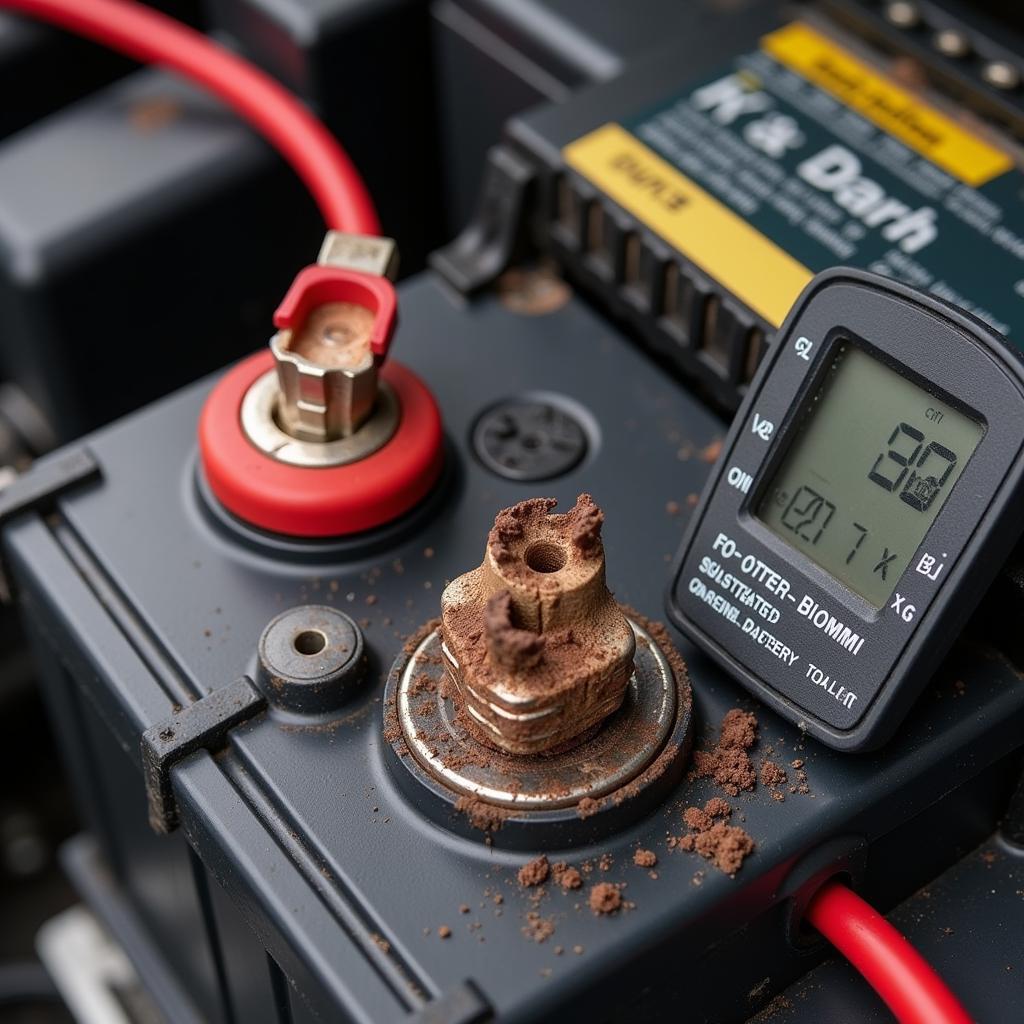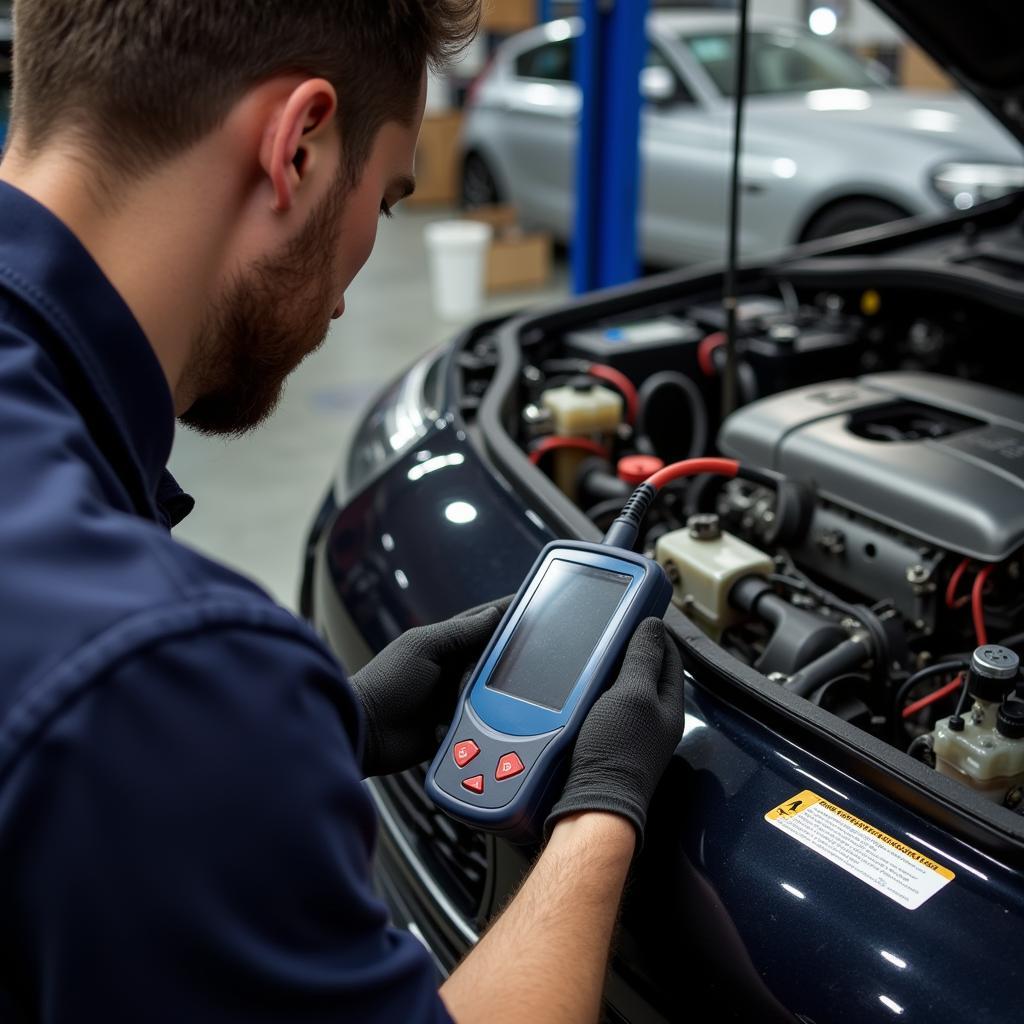Experiencing the frustration of a car that won’t start due to an electrical problem? This comprehensive guide delves into the common culprits behind this issue, providing practical solutions for car owners, mechanics, and automotive technicians. We’ll explore everything from simple checks to more complex diagnostic procedures, empowering you to tackle this problem head-on.
A car refusing to start because of an electrical issue can be caused by a range of problems, from a dead battery to a faulty starter motor. Diagnosing the root cause is key to getting your vehicle back on the road quickly and efficiently. Don’t let an electrical problem leave you stranded. Learn how to identify and fix the issue with this detailed guide. For car owners experiencing other issues, you might find our article on cars with rust problems helpful. cars with rust problems
Common Causes of Electrical Problems Preventing Car Start
There are several potential electrical culprits that can prevent your car from starting. Identifying the specific issue requires a systematic approach and some basic understanding of your car’s electrical system.
Battery Issues
The most common Electrical Problem Causing Car Not To Start is a dead or weak battery. Corrosion on the battery terminals, loose connections, or simply an old battery can all contribute to starting problems.
- Check the battery terminals: Look for corrosion or loose connections. Clean the terminals with a wire brush and baking soda solution. Tighten any loose connections.
- Test the battery voltage: Use a multimeter to check the battery’s voltage. A fully charged battery should read around 12.6 volts.
- Jump-start the car: If the battery is weak, try jump-starting the car. If the car starts, this confirms a battery issue.
 Dead Car Battery Preventing Start
Dead Car Battery Preventing Start
Starter Motor Problems
A faulty starter motor can also prevent the engine from cranking. The starter is responsible for engaging the engine’s flywheel and initiating the combustion process.
- Listen for clicking sounds: When you turn the key, if you hear a clicking sound, but the engine doesn’t crank, it might indicate a starter motor problem.
- Test the starter: A mechanic can test the starter motor using specialized equipment to determine if it’s functioning correctly.
Alternator Malfunction
While a bad alternator won’t prevent your car from starting initially, if it’s not charging the battery, it will eventually lead to a dead battery and starting problems. You can check out our article about alternator problems for more details. alternator in cars problem
Ignition System Faults
The ignition system provides the spark needed to ignite the fuel-air mixture in the engine. A faulty ignition switch, coil, or distributor can prevent the car from starting.
- Check the ignition switch: Ensure the key turns smoothly in the ignition.
- Inspect the ignition coil and distributor: Look for damage or wear.
Diagnosing and Solving Electrical Starting Problems
Sometimes, the problem might not be obvious. Here’s a more detailed approach to diagnosing and solving electrical problems causing a car not to start:
- Check the Obvious: Start with the basics like the battery, terminals, and connections.
- Inspect Fuses and Relays: A blown fuse or a faulty relay can interrupt the electrical flow to critical components. Check your owner’s manual for the fuse box location and the relevant fuses to check.
- Test the Starter: Use a multimeter or a test light to check the voltage at the starter motor. If there’s no power reaching the starter, trace back along the wiring to find the break.
- Examine the Ignition System: Test the ignition coil, distributor cap, and rotor for any signs of damage or wear.
- Consult a Professional: If you’re unable to pinpoint the problem, consult a qualified auto electrician. They have the expertise and specialized equipment to diagnose and repair complex electrical issues. You can learn more about common car electrical problems here. define in car electric problems
“A systematic approach is essential when diagnosing car starting problems. Start with the simple checks and gradually move towards the more complex ones,” advises John Smith, Senior Automotive Technician at Auto Experts Inc.
Why Is My Car Not Starting? Common Questions
This section addresses some frequently asked questions related to car starting issues.
How do I know if it’s an electrical problem?
Signs of electrical problems include dimming lights, clicking sounds when turning the key, or a complete lack of response from the starter.
Can a bad alternator cause starting problems?
A bad alternator won’t directly prevent starting but can lead to a dead battery, eventually preventing the car from starting.
What should I do if my car won’t start after a jump-start?
If the car starts with a jump but won’t start again later, the battery is likely the problem, but it could also be the alternator failing to charge.
How much does it cost to fix an electrical problem causing a car not to start?
The cost varies greatly depending on the specific problem, ranging from a simple battery replacement to more complex repairs involving the starter or ignition system. You might find this article helpful if you own a Saab: problems with saab cars
 Mechanic Checking Car Electrical System
Mechanic Checking Car Electrical System
What are some preventive measures for electrical problems?
Regularly checking and cleaning battery terminals, ensuring tight connections, and having your alternator tested periodically can prevent many electrical starting problems.
Can extreme temperatures affect car starting?
Yes, both extreme heat and cold can affect battery performance and other electrical components, making it harder for the car to start.
Can I fix electrical problems myself?
Some basic electrical issues, like cleaning battery terminals or replacing fuses, can be DIY projects. However, more complex problems require the expertise of a qualified mechanic. Issues with your car’s rev meter could also be related to electrical problems. Check our article for more information. car rev meter problem
Conclusion
An electrical problem causing car not to start can be a frustrating experience, but with a systematic approach to diagnosis and troubleshooting, the culprit can often be identified and resolved. From simple battery issues to more complex problems with the starter or ignition system, this guide has covered the common causes and provided practical solutions. Remember, safety is paramount. If you’re unsure about any step, don’t hesitate to contact a qualified auto electrician for assistance.
“Prevention is always better than cure. Regular maintenance and checks on your car’s electrical system can save you from headaches down the road,” adds Maria Garcia, Electrical Systems Specialist at Auto Solutions Ltd.
For any assistance with your automotive electrical issues, contact AutoTipPro at +1 (641) 206-8880. Our office is located at 500 N St Mary’s St, San Antonio, TX 78205, United States.




Leave a Reply